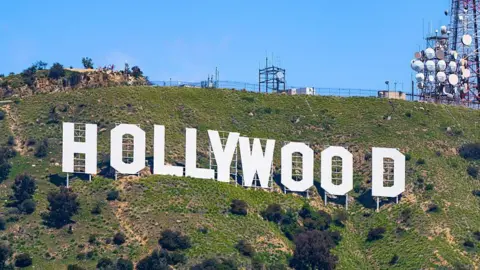US President Donald Trump has declared an ambitious plan to impose a staggering 100% tariff on movies produced outside the United States. This significant move comes amid escalating trade disputes with multiple nations and has garnered substantial attention from various sectors, including Hollywood.
In remarks made via his Truth Social platform, Trump articulated that this initiative is a response to what he perceives as a critical threat to the American film industry, which he claims is experiencing a “very fast death.” According to Trump, a “concerted effort” by foreign countries to attract filmmakers and studios through financial incentives has placed the integrity and viability of the US movie industry at risk. He goes on to characterize this situation as a matter of national security, emphasizing the importance of promoting films that reflect American values.
Trump’s sentiment captures a larger narrative of promoting domestic production and protecting national industries. He has vowed to ensure that movies made in America take precedence, stating emphatically, “WE WANT MOVIES MADE IN AMERICA, AGAIN!” This call to action resonates with his administration’s broader agenda of advocating for American-made goods and defending jobs that he feels are under threat from international competition.
Since his return to the presidency in January, Trump has increased tariffs on a range of products from various countries. His administration argues that such measures will bolster US manufacturing and safeguard jobs, yet these policies have stirred chaos in the global economy. As a direct consequence, prices of imported goods are anticipated to rise significantly, impacting consumers and businesses alike.
Among the nations most affected by Trump’s tariff policies, China stands out as the primary target. Trump has instituted import taxes soaring as high as 145% on certain Chinese products. Recent reports indicated that, when coupled with existing tariffs, the total levies on some Chinese goods could skyrocket to an eye-popping 245%. In retaliation, Beijing has enacted a 125% import duty on American goods, escalating the trade tensions between the two economic superpowers.
Furthermore, many countries are currently subject to a baseline 10% tariff from the US, which is set to remain in effect until a pause on higher levies concludes in July. This levying strategy extends its reach into the realms of entertainment and culture, reflecting an unprecedented intertwining of trade policy and creative industries.
While speaking onboard Air Force One, Trump elaborated on his talks with numerous countries regarding trade agreements. However, when pressed about potential discussions with Chinese President Xi Jinping, he indicated that no such plans were in place for the immediate future. In addressing the possibility of forthcoming trade agreements, Trump suggested it was plausible that announcements could occur within the week, displaying a level of uncertainty that characterizes much of his administration’s trade negotiations.
This newly proposed film tariff adds another layer to ongoing discussions about trade policy and its implications for industries beyond manufacturing. As the global landscape shifts, industry leaders and economic analysts will closely monitor the fallout of Trump’s bold announcement, particularly how it could reshape the American cinematic landscape and its competitive standing against international productions.
In summary, Trump’s assertion of a 100% tariff on non-US movies highlights a steadfast commitment to preserving and revitalizing the American film industry. It underscores an ongoing theme of national protectionism that reverberates through broader economic discussions while simultaneously igniting fierce debates around cultural influence, artistic expression, and trade rights in an increasingly interconnected world economy. As these developments unfold, both Hollywood and the broader public will grapple with the potential ramifications of such policies.



